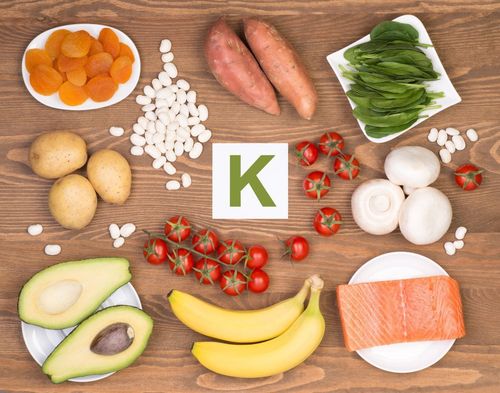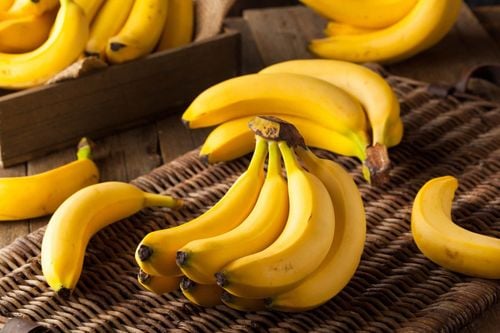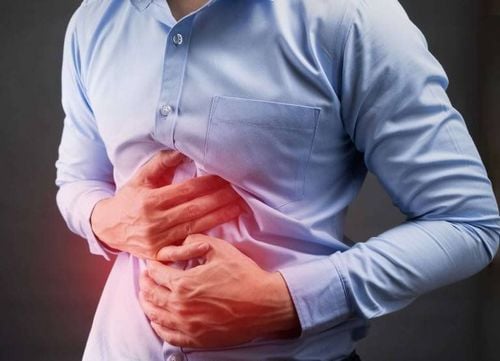This is an automatically translated article.
Potassium in the body is present in all cells and is an essential component of life. Absorbing potassium in nature from food sources and daily diet plays a very important role for people to have a good health.1. What is the role of potassium in the body?
In fact, many people do not realize the essential role of potassium in the body and have not focused on adding potassium from the daily diet.
1.1. Potassium helps stabilize blood pressure Health experts say that high blood pressure is a major risk factor for stroke and heart-related diseases. Meanwhile, a diet rich in potassium has the ability to reduce blood pressure very well. Potassium can curb high blood pressure by making arteries more flexible, as well as helping the body get rid of excess sodium (because sodium causes water retention, which can lead to high blood pressure).
Although a diet with foods rich in potassium can regulate blood pressure, but to effectively lower blood pressure, the body will need the impact of a few other important minerals. In other words, building a diet rich in potassium in nature will always be accompanied by additional calcium and magnesium. Specifically, items like: fruits and vegetables, low-fat or fat-free milk, beans, nuts, whole grains, lean meats, fish, and poultry.
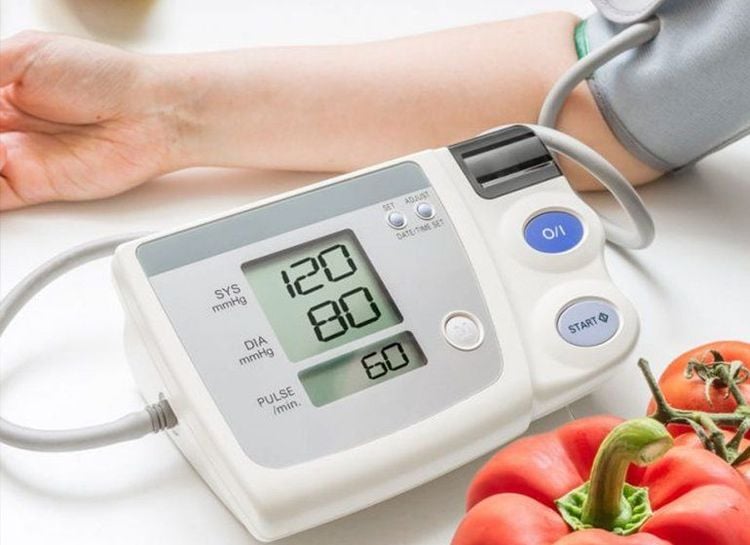
Kali giúp ổn định huyết áp rất tốt
1.2. Other functions Potassium in the blood acts as an electrolyte to help maintain fluid balance. Potassium is also responsible for supporting the functioning of the brain, nerves, as well as keeping the heart and muscles working properly. In addition, potassium also has the ability to protect and strengthen bones, help fight bone loss, as well as reduce the risk of kidney stones.
Supplementing enough potassium in the body every day will help improve health and prevent some chronic diseases. Conversely, chronic potassium deficiency can jeopardize long-term health in a variety of ways.
2. Does your body have enough potassium?
Nutritionists recommend that an adult needs 4,700 milligrams of potassium per day to be considered a balanced diet. But in reality, the average potassium intake is often lower than the norm, specifically a man only adds about 3,200 milligrams of potassium per day and this figure in women is 2,400 milligrams.
The reason why many people do not get enough potassium is because modern life today inadvertently causes us to regularly consume processed foods at supermarkets and fast food restaurants, as well as not focus on adding vitamins and minerals potassium in nature. Experts say that fresh foods (such as fruits, vegetables, milk, ...) and simply processed foods are the food groups with the most potassium.
The way food is prepared also affects the potassium content in the raw food source. Specifically, cooking for too long under high heat will deplete nutrients, for example a boiled potato has only nearly 50% of the potassium compared to a baked potato. Therefore, to ensure maximum absorption of potassium, you should choose to eat fresh fruits and vegetables, if processed, just bake or steam briefly.
If you have to go out to eat, change your habits and order healthier foods like: salads or legumes, steamed or grilled vegetables, juices and low-fat milk instead of soda to Increases absorption of potassium in the body.
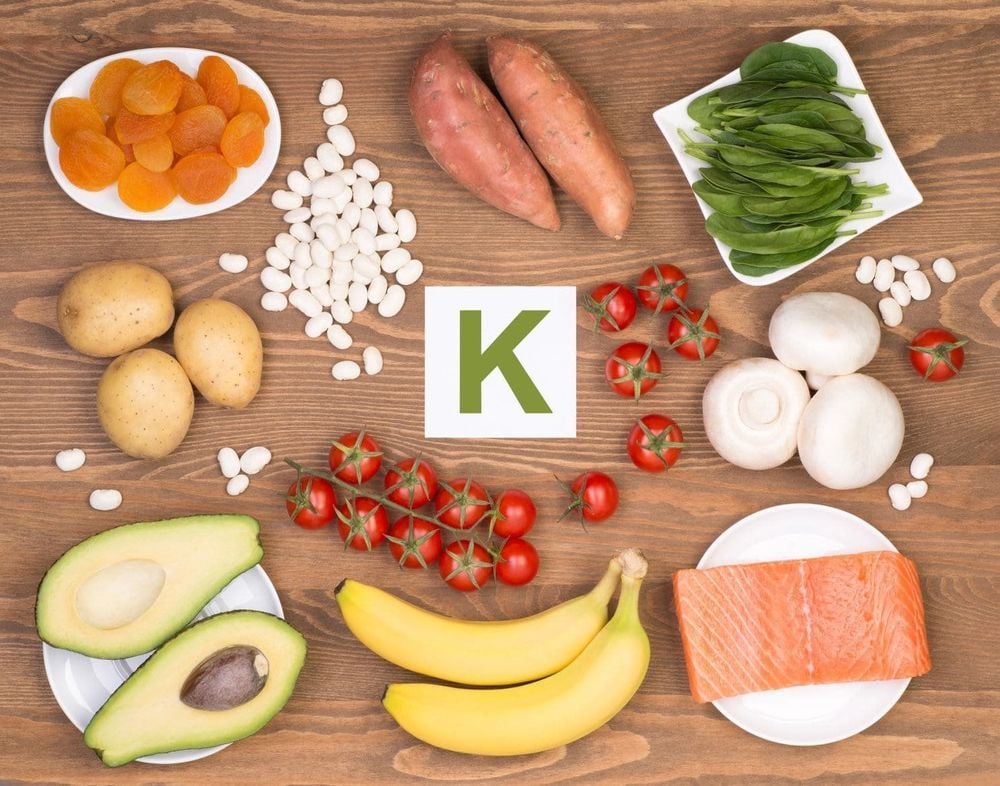
Hấp thu đủ 4.700 miligam kali mỗi ngày mới được xem là một chế độ ăn uống cân bằng, giúp cơ thể bạn luôn đủ Kali.
3. Food sources rich in potassium
Nutritionists say that it is advisable to meet the need for potassium in the blood from natural food sources instead of choosing supplements.
Potassium is also easy to find in other nutrient-rich and healthy foods, such as fiber. According to the United States Department of Agriculture (USDA), the potassium content of some specific dishes is:
| Loại thực phẩm | Khẩu phần | Hàm lượng kali |
| Bí đao hoặc bí đỏ luộc | 1 chén | 896 mg |
| Khoai lang nướng | 1 củ cỡ vừa | 694 mg |
| Khoai tây nướng | 1 củ cỡ vừa | 610 mg |
| Đậu trắng đóng hộp | Nửa cốc | 595 mg |
| Sữa chua không béo | 1 cốc | 579 mg |
| Cá bơn (Halibut) nấu chín | 85g | 490 mg |
| Cam ép nguyên chất | 250ml | 496 mg |
| Bông cải xanh luộc | 1 chén | 457 mg |
| Dưa lưới xắt miếng | 1 chén | 431 mg |
| Chuối | 1 quả vừa | 422 mg |
| Thịt lợn thăn nấu chín | 85g | 382 mg |
| Đậu lăng luộc | Nửa cốc | 366 mg |
| Sữa ít béo | 250ml | 366 mg |
| Cá hồi nấu chín | 85g | 326 mg |
| Hạt dẻ cười rang bóc vỏ | 28g | 295 mg |
| Nho khô | 1/4 cốc | 250 mg |
| Ức gà nấu chín | 85g | 218 mg |
| Cá ngừ đóng hộp | 85g thịt nạc | 201 mg |
4. What factors affect the amount of potassium in the body?
Potassium levels in the body will be affected by a number of factors, including kidney function, hormones and medications being taken, specifically:
Patients taking diuretics to treat high blood pressure may have may need more potassium. This is because some diuretics deplete blood potassium, similar to the effects of steroids and laxatives; In contrast, drugs used to lower blood pressure, such as beta-blockers and ACE inhibitors, increase potassium levels in the body. Patients with impaired kidney function may need to limit their daily potassium intake. Potassium is one of the essential minerals for the human body. You should consult with your doctor about the interaction between all medications you are taking and potassium levels in the body to guide appropriate dietary adjustments.
Please dial HOTLINE for more information or register for an appointment HERE. Download MyVinmec app to make appointments faster and to manage your bookings easily.
Reference source: webmd.com






